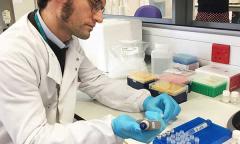We are Epilepsy Society. The UK’s only charity transforming the lives of people with epilepsy through world-leading research, advocacy and care.

Leading care provider
Our range of care is tailored to the needs of each individual, and our professional staff are committed to maximising the life potential of everyone within our care homes.

Cutting edge research
Epilepsy Society's Chalfont Centre is unique in bringing together intellectual capital to form a powerhouse multidisciplinary team who contribute to a wide ranging spectrum of research.

Epilepsy Support
Our confidential epilepsy helpline and online information give help and support to people who are affected by epilepsy.

Advocacy
We are a voice for people with epilepsy, striving to push epilepsy up the political agenda and bring about change at government level.
Care services
We are the leading charity care provider, where people love to work and live. Our wide range of care is tailored to the needs of each individual, and our professional staff are committed to maximising the life potential of everyone within our care homes.
Medical services
The Chalfont Centre and our Gowers unit lead the way in the most advanced techniques for the diagnosis and treatment of epilepsy.
Campaigns
Our campaigns team lobby government and decision-makers on the issues that matter to people with epilepsy. From safer medicines for pregnant women to the dangers of online trolling, and from medicines supply to public transport access, we raise awareness of the daily challenges facing people with epilepsy.
Latest news
Scotland gets new drug for Lennox Gastaut syndrome – now England waits
Children over the age of two and adults with Lennox-Gastaut syndrome (LGS) in Scotland can now be prescribed the anti-epilepsy medication, fenfluramine.
Epilepsy Society research published in Brain Communications Journal
A study conducted by a team of researchers from the Epilepsy Society, including Professor Sanjay Sisodiya and Angeliki Vakrinou has been published in the Brain Communications Journal. The study explores the genetics of rare epilepsies including Dravet Syndrome.
Medication shortages in the news
As part of our medications shortages campaign, our CEO, Clare Pelham was interviewed on BBC Look North, alongside the mother of 44-year-old David Crompton who tragically died after being given an IOU for his epilepsy medication by his pharmacy.
Epilepsy Society writes to Health Secretary following a death linked to medicine shortages
The Epilepsy Society has written to Health Secretary Wes Streeting, following the death of a 44-year old man with epilepsy, after he was given an IOU for medication to control his seizures.
Shortage of epilepsy medication a contributing factor to man's death
A man with epilepsy, David Crompton, died after a fall downstairs last December, and in a report issued on New Year’s Eve, the West Yorkshire senior coroner found that his epilepsy was a contributing factor.
New family GPs must be trained in epilepsy, says the Epilepsy Society
The Epilepsy Society has welcomed government plans to bring back the family doctor, promising greater continuity of care for people with long-term health conditions. And it has offered help to ensure that GPs receive better training in epilepsy so that they can fully support those with the condition.
Our research
Genomics
Read how we are working to understand the genetic architecture of each individual person's epilepsy through our world leading genomics research programme.
Therapeutic Drug Monitoring (TDM)
Therapeutic drug monitoring (TDM) is an area of clinical chemistry that specialises in measuring medication levels (concentrations) in patients, usually through blood samples but also through saliva samples.
Research
The ultimate goals of our current research are to spearhead personalised treatment and to incorporate genomic diagnosis into the NHS for people with epilepsy.

You can call our helpline on 01494 601 400.
We're open:
Monday and Wednesday - 9am to 7.30pm
Tuesday, Thursday, and Friday - 9am to 4pm
Saturday - 9am to 12.30pm
You can also reach us by email
helpline@epilepsysociety.org.uk.







